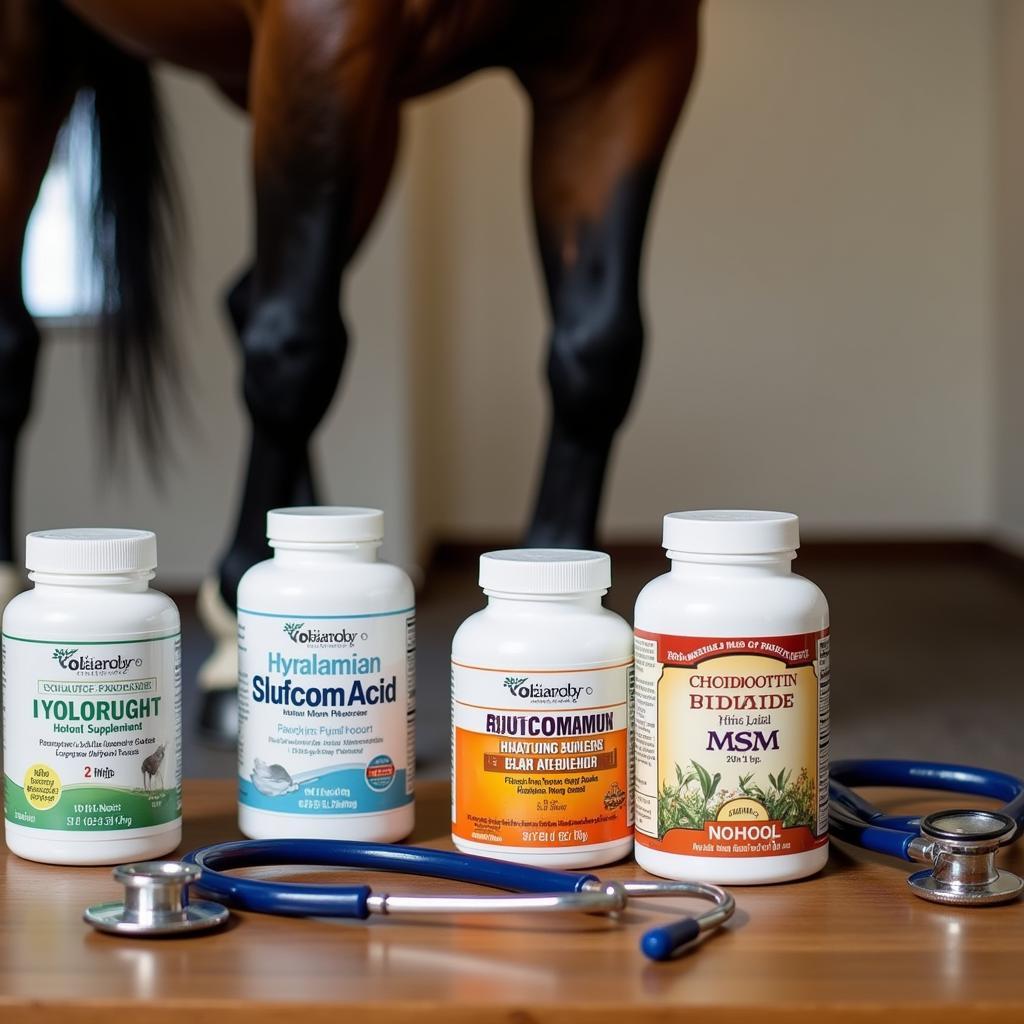Hyaluronic acid (HA) is a naturally occurring substance found in the connective tissues of all mammals, including horses. It plays a crucial role in joint health, lubrication, and overall mobility. This guide will explore the benefits, uses, and considerations of hyaluronic acid for horses, helping you make informed decisions about your equine companion’s well-being.
Understanding Hyaluronic Acid in Horses
Hyaluronic acid is a glycosaminoglycan, a type of complex sugar molecule, that acts as a cushion and lubricant in joints, tendons, and other tissues. It’s essential for maintaining healthy cartilage, reducing inflammation, and supporting joint flexibility. As horses age or experience strenuous activity, their natural HA production can decrease, leading to joint stiffness, discomfort, and reduced performance. Supplementing with HA can help replenish these levels and support optimal joint function. You might consider Acti-Flex joint supplement for horses if you are looking for a supplement to support your horse’s joint health.
“HA is like the oil in a car engine,” explains Dr. Emily Carter, DVM, specializing in equine sports medicine. “It keeps everything running smoothly and prevents wear and tear.”
Benefits of Hyaluronic Acid for Horses
The use of hyaluronic acid in horses offers a range of benefits, including:
- Improved Joint Lubrication: HA helps maintain the viscosity of synovial fluid, the lubricant that cushions joints and allows for smooth movement.
- Reduced Inflammation: HA possesses anti-inflammatory properties that can help soothe irritated joints and alleviate pain associated with arthritis or injury.
- Enhanced Cartilage Health: HA supports the production and maintenance of healthy cartilage, which is crucial for absorbing shock and protecting bones within the joint.
- Increased Mobility and Flexibility: By improving joint lubrication and reducing inflammation, HA can enhance a horse’s range of motion and overall flexibility.
Different Forms of Hyaluronic Acid for Horses
Hyaluronic acid for horses is available in various forms, including:
- Injections (IA): Intra-articular injections deliver HA directly into the affected joint. This method provides targeted relief and is often used for acute injuries or chronic conditions. Check out our page on Adequan injections for horses for more information.
- Oral Supplements: Oral HA supplements are administered through feed or as a standalone product. While oral absorption can be less efficient than injections, it offers a convenient and non-invasive way to support overall joint health. For example, you could explore tendon supplements for horses.
- Topical Applications: Topical HA gels or creams are applied directly to the skin over the affected area. This method is primarily used for localized issues such as wounds or skin irritations.
Choosing the Right Hyaluronic Acid Product
Selecting the appropriate HA product for your horse depends on several factors, including the severity of the condition, the horse’s age and overall health, and your budget.
What are the different ways hyaluronic acid is administered to horses?
Hyaluronic acid can be administered through intra-articular injections, oral supplements, or topical applications.
How much hyaluronic acid does a horse need?
The dosage of hyaluronic acid varies depending on the specific product and the horse’s individual needs. Consulting with a veterinarian is crucial to determine the appropriate dosage.
“It’s crucial to work with your veterinarian,” emphasizes Dr. Sarah Mitchell, PhD, equine nutritionist. “They can assess your horse’s specific needs and recommend the most appropriate form and dosage of HA.”
Hyaluronic Acid and Other Joint Supplements
HA can be used in conjunction with other joint supplements, such as glucosamine, chondroitin sulfate, and MSM, to provide comprehensive joint support. These supplements work synergistically to address different aspects of joint health, maximizing their effectiveness. Consider exploring navicular horse supplements for more comprehensive options. If you’re looking for a specific brand, you can also research Actiflex Horse.
 Hyaluronic Acid and Other Joint Supplements
Hyaluronic Acid and Other Joint Supplements
Conclusion
Hyaluronic acid is a valuable tool for supporting equine joint health and maintaining optimal performance. By understanding its benefits, various forms, and how to choose the right product, you can help ensure your horse enjoys a long and active life.
FAQ
- Can hyaluronic acid be used for all horses? Yes, but consult with a vet.
- Are there any side effects of hyaluronic acid? Side effects are rare but can include mild swelling at the injection site.
- How long does it take to see results from hyaluronic acid? Results vary, but some improvement can be seen within a few weeks.
- Can I give my horse human hyaluronic acid supplements? No, always use products specifically formulated for horses.
- Is hyaluronic acid a cure for arthritis? No, but it can help manage symptoms and slow progression.
- What is the best way to store hyaluronic acid products? Follow the manufacturer’s instructions for storage.
- How much does hyaluronic acid for horses cost? The price varies depending on the form and brand.
Common Scenarios and Questions
- Scenario: My horse is showing signs of stiffness after exercise. Question: Could hyaluronic acid help?
- Scenario: My older horse has been diagnosed with arthritis. Question: What form of HA is best for long-term management?
- Scenario: My performance horse is experiencing joint discomfort. Question: Can HA injections improve their performance?
Further Reading and Resources
Check out our other articles on equine health and wellness.
Need more help? Contact us! Phone: 0772127271, Email: [email protected] or visit us at QGM2+WX2, Vị Trung, Vị Thuỷ, Hậu Giang, Việt Nam. We have a 24/7 customer service team.